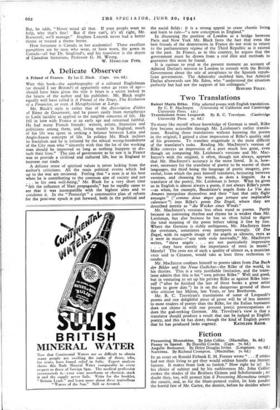A Delicate Observer
A Friend of France. By Ian E. Black. (Cape. los. 6d.) WHY this book—the autobiography of a cultured Englishman (or should I say Briton?) of apparently some 4o years of age— should have been given the title it bears is a secret locked in the hearts of the author and his publisher. Mr. Black might equally well have called it A Friend of the Stage, The Evolution of a Financier, or even A Metaphysician at Large.
Mr. Black's style is rather that of the dissociation d'idees of Remy de Gourmont, and he passes easily from metaphysics to Latin lucidity as applied to the tangible concerns of life. He fell in love with France at an early age and remained faithful. He had many French friends : writers, artists, financiers and politicians among them, and, living mainly in England, much of his life was spent in seeking a balance between Latin and Anglo-Saxon concepts of life. In politics Mr. Black inclines to Socialism and he is irritated by the ethical wrong-headedness of the City men who " sincerely wish that the lot of the working man should be improved so long as nothing happens to dis- turb their lives." The aim of government as he saw it in France was to provide a civilised and cultured life, but in England to increase our trade.
A delicate sense of spiritual values is never lacking from the author's criticisms. All the main political events which led up to the war are reviewed. Feeling that " a man is at his best when he is contributing to the common aim of society and not . . . to his own well-being," Mr. Black for a very short time " felt the influence of Nazi propaganda," but he rapidly came to see that it was incompatible with the highest aims and to condemn it. In the " Postscript " a constructive plan of reform for the post-war epoch is put forward, both in the political and the social fields : it is a strong appeal to cease chaotic living and learn to rule—" a new conception in England."
In discussing the position of London as a bridge between Paris and New York Mr. Black faces the fact that even the best friends of the democracies in France do not wish to return to the parliamentary regime of the Third Republic as it existed in the past. In France, as in this country, he argues that the government must be drawn from a real elite and methods to guarantee this must be found.
It is curious to read at the present moment an account of Admiral Darlan's mission to London to consult with the British Government about the sale of aeroplanes to the Spanish repub- lican government. The Admiralty snubbed him, but Admiral Darlan afterwards saw Mr. Eden, who " understood the situation perfectly but had not the support of his colleagues."
BERNARD FOLEY.


























 Previous page
Previous page